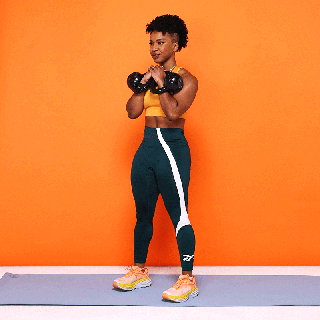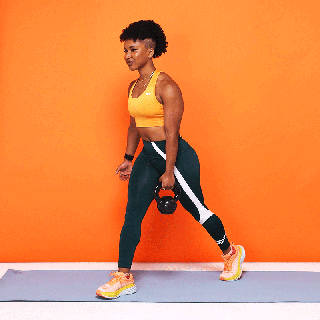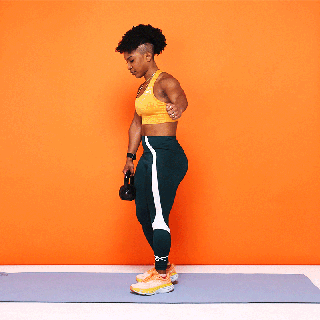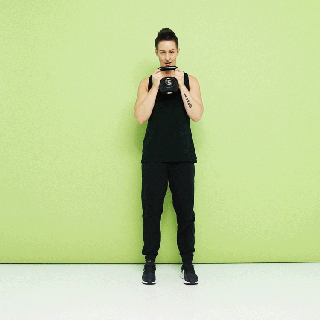When you’re focusing on improving your overall fitness, building lower-body strength should be one major item on your to-do list. Adding a kettlebell legs workout to your weekly rotation will make it easy to check off—and you don’t need to stuff it with tons of moves, either.
If you’re looking to create a leg-day routine you can build upon as you get stronger, you’ll want to focus on squat or hinge movements—better yet, work in both, certified personal trainer Morit Summers, owner of Form Fitness Brooklyn, tells SELF. “It’s also a good idea to have movements using both legs, like a squat, and single-leg movements, like a lunge,” she adds. That’s because they train your body in different ways, which is important for strength both inside and outside of the gym. Using both legs to do a move makes it easier to lift heavy and improve absolute strength, and single-leg movements tap into balance and coordination and help you spot—and fix—any muscle imbalances from side to side.
In the workout Summers created for SELF below, you’ll use kettlebells for these kinds of exercises, which work your muscles a little differently than dumbbells thanks to their unique shape. There are just four moves here, and they target every part of your lower body: your quads (the front of your thighs), hamstrings (back of your thighs), hip adductors (inner thighs), hip abductors (outer thighs), and the soleus and gastrocnemius (your calves). They also hit your glutes—it’s hard to really work your legs and not your butt, too.
Because this kettlebell legs workout emphasizes basic movement patterns, it’s a great staple to have as part of your weekly program. “A plan helps keep people on track,” Summers adds. “It helps take the guesswork out of what you should do.” What’s more, repeating a workout week after week provides a good baseline to monitor your progress as you go. Gradually adding more resistance or reps is called progressive overload, and it’s vital for keeping your workout challenging—and your muscles getting stronger. A workout like this one, which focuses on one exercise at a time with solid rest time in between, allows you to lift heavy enough to really see the strength gains you’re after.
But arguably the most important quality of a great go-to workout? You actually like doing it. It feels challenging, yet also inspires you to work and get better at it, Summers says. Hopefully, this routine does just that!
The Workout
What you need: Two medium-to-heavy kettlebells—the exact weight will depend on your experience and fitness level. Summers says you want to choose one that’s heavy enough so that the last two to three reps of each exercise feel hard, but not impossible to do with proper form. She recommends reassessing after each set and increasing the weight if you need to. “If you could have done five more reps at the weight you were using, grab a heavier weight for the second set,” she suggests. On the other hand, if you can only squeak out five reps at the weight you chose, lighten it up.
Exercises
- Front Squat
- Suitcase Split Squat
- Single-Leg Deadlift
- Lateral Lunge
Directions
- Do 8–10 reps of one exercise, then rest for 1 to 2 minutes. Repeat for 3 to 4 rounds total.
- After doing all your sets of one exercise, move onto the next move.
Demoing the moves below are Alicia Jamison (GIFs 1-3), senior coach at Body Space Fitness and adjunct lecturer at Brooklyn College; and Amanda Wheeler (GIF 4), host of the Covering Ground podcast.
 Katie Thompson1Front Squat
Katie Thompson1Front Squat- Stand with your feet shoulder-width apart, toes turned out slightly, holding a kettlebell in each hand at your shoulders. Hold the weights by the handles, using an overhand grip so that your palms are facing in toward each other and the bells are resting in front of your shoulders.
- Engage your core and keep your chest lifted and back flat as you shift your weight into your heels, push your hips back and bend your knees to lower into a squat.
- Drive through your heels to stand and squeeze your glutes at the top for 1 rep.
 Katie Thompson2Suitcase Split Squat
Katie Thompson2Suitcase Split Squat- Hold a kettlebell in your left hand with your arms down by your sides. With your feet underneath your shoulders, step your right foot forward as if you were doing a forward lunge; keep your other heel firmly planted. This is the starting position.
- Bend both knees to create 90-degree angles with your legs. Hinge forward at the hips so that your torso is leaning slightly forward. Keep your core engaged so that your back remains flat and doesn’t arched or round forward. Your front quad should be parallel to the floor and your knee should be above your foot. Your butt and core should be engaged.
- Push through your front foot to return to the starting position. This is 1 rep.
- Do 8-10 reps on one leg, and then switch legs and do the same number of reps on that side.
WATCH20-Minute Total Arms Workout
ADVERTISEMENT
 Katie Thompson3Single-Leg Deadlift
Katie Thompson3Single-Leg Deadlift- Stand with your feet together, holding a kettlebell in your right hand in front of your leg. This is the starting position.
- Shift your weight to your left leg. Keeping your back flat and a slight bend in your left knee, hinge forward at the hips, push your butt back, and raise your right leg straight behind your body as you lower the weight toward the floor until you feel a stretch in your left hamstring.
- Keeping your core tight, push through your left heel to stand up straight and pull the weight back up to the starting position, squeezing your butt at the top. Bring your right leg back down to meet your left, but just let your toes tap the floor lightly—don’t put any weight on your foot. That’s 1 rep.
- Do 8-10 reps, and then switch sides and repeat the same number of reps.
 Katie Thompson4Lateral Lunge
Katie Thompson4Lateral Lunge- Stand with your feet hip-width apart. Hold a kettlebell by the handle with both hands at your chest. This is the starting position.
- Take a big step out to the right. Bend your right knee, hinge forward at the hips, and sit your butt back to lower into a lateral lunge. Keep your back flat and core engaged, and make sure your knee doesn’t move forward beyond your toes.
- Push through your right heel to return to the starting position. That’s 1 rep.
- Do 8-10 reps with the right leg, and then repeat 8-10 reps on the left leg.

